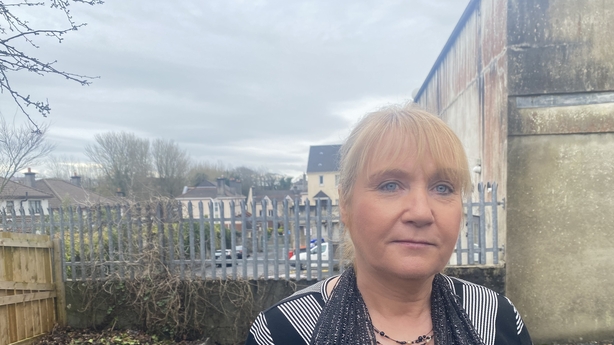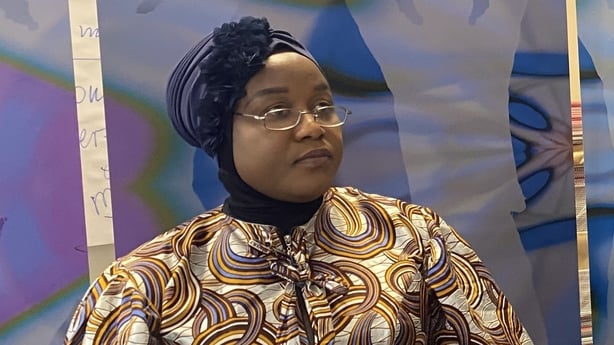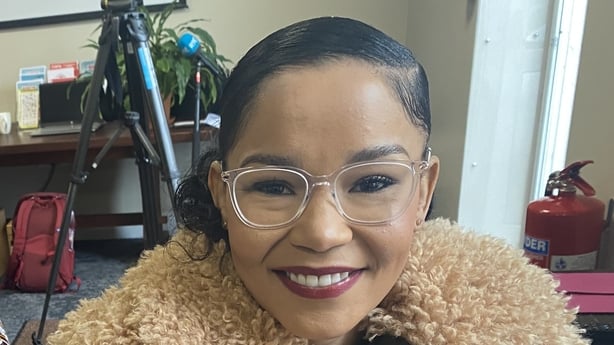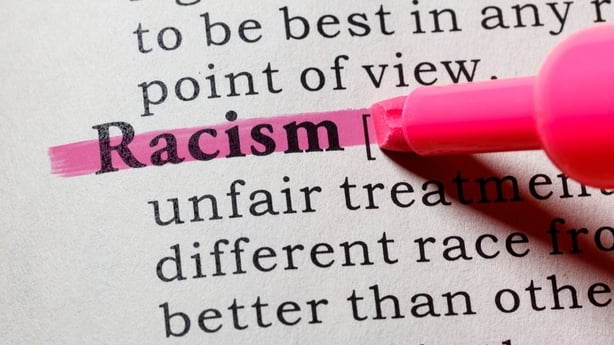In Galway, a number of organisations have come together to voice their opposition to racism and discrimination.
They include the Galway Traveller Movement, Amach LGBT and Galway City Partnership.
Nora Corcoran is a settled Traveller living in Ballinasloe. She is a mother, grandmother and a leading campaigner within the Galway Traveller Movement.
"As a Traveller woman, I've been discriminated against all my life, from being bullied on the school bus as a kid to getting turned away from clubs as a teenager, and later from pubs and restaurants as an adult. That has such a negative impact on your self-esteem, and leads to chronic anxiety.
"And so, I became an activist for positive change, to fight for social justice and come together in solidarity with other diverse groups. This is 2023. It's time to eliminate racism and end discrimination. We have to stand together and say enough is enough."

Nora says education is key and she herself graduated with an honours degree in business, social enterprise and leadership last year.
"You create your own positive narrative and reclaim your power. We are one of the oldest communities in Ireland. We deserve to be recognised, not vilified. We are Travellers and we're not going anywhere. We're here to stay and we need to be accepted."
Aisha Kadejo is 10-years-old and says she doesn't experience a lot of racism at school in Galway but she calls it out when there's an incident.
"Once I heard someone use the "N" word and it's not very nice. It's kind of racist to us so I went to tell the teacher and they sorted it out and he got what he deserved. But that's the only time I've ever seen it happen, so I don't really experience it that much."
Islammiyah Saudique Kadejo is CEO of Galway Online Community Radio. GOCOM is Ireland's first ethnic minority channel and multilingual community radio. She uses her platform to promote equity for all groups experiencing racism and discrimination.

"It's about getting the information out there. We are the diverse voices against racism, whether it's the migrant community, the Traveller community, people with disabilities, the LGBTQ+ community. They are not represented enough in the mainstream media. So, this is an opportunity to once again make our voice heard. Racism and discrimination impacts our voices personally, impacts us emotionally and economically, impacts our work, impacts our children. And we want to put a stop to that."
There is concern too that the emergence of far-right groups has promoted anti-migrant sentiment.
Mysie Badenhorst lives in Direct Provision in Galway.
"I know there's a housing crisis in Ireland but I think some people hide behind that in terms of racism. I've recently been moved from Direct Provision in Dublin to Tuam and I'm hoping that meetings like this one in Galway will help get our message out and raise awareness of discrimination and racist incidents.

"It's a positive event and we're celebrating International Week Against Racism with one voice. The reality is that we are stronger together if we want to create a positive change and address the systemic causes of social exclusion."
Galway Communities against Racism and Discrimination will hold a rally in Eyre Square on Saturday at 2pm.

Rise in reports of racist-related incidents last year
The number of racist related incidents reported to the iReport website last year reached 600, compared to 404 in 2021.
Criminal offences increased significantly in 2022, according to the Irish Network Against Racism.
The iReport website recorded 223 criminal incidents, including racist assaults, a record 190 reports of illegal discrimination and 136 reports of hate speech.
The latest findings also show a deteriorating level of confidence in gardaí among minorities, with a further fall in the number of crimes reported.
In 2020, 43% of people reported crimes to An Garda Síochána - this fell to 25% in 2021. In 2022, the figure dropped again to 20%
Yesterday, the Taoiseach said he believed that racial profiling by gardaí can happen unintentionally.
Speaking at the launch of the Government's Action Plan Against Racism, Leo Varadkar said that while he did not have substantial evidence to prove that it was a problem within the force, he believed that assumptions could sometimes be made because of people's appearance.
The latest iReport findings show that all categories of racist incidents increased last year and reports of discrimination nearly doubled overall.
The highest level of discrimination (33%) was against those described by INAR as Black Irish, Black African and Black Other, up from 24% in 2021.
The highest level of crime (32%) was targeted at the same group, compared to Chinese and other Asians in 2021.
Reported assaults also increased.
INAR Board member Fionnuala O'Connell said that the 2022 data confirmed that racism "is an every day reality for people from minoritised groups".
She said that "the persistent levels of repeat harassment, and the continued lack of clear responses when they are reported to the authorities is a cause for ongoing concern".
Preliminary findings from 2023 also show a worsening atmosphere for minoritised groups according to INAR.
Ms O'Connell said: "In recent months the Far Right's promotion of anti-migrant sentiment has led to an increase in contact with INAR from minority people expressing fear for themselves and their families.
"This atmosphere is having a deleterious impact on community confidence, and further marginalises already marginalised groups. Effective responses from the authorities can help reverse this."
Yesterday, the Government announced a National Action Plan on Racism to tackle the problem.
The Chair of the Anti-Racism Committee and Commissioner with the Irish Human Rights and Equality Commission said the figures are "no surprise".
Speaking on RTÉ's Morning Ireland, on Professor Caroline Fennell said it is evident that there is a problem with racism in Ireland.
She said it is an international phenomenon that Ireland is no exception to.
INAR's Policy Lead and Chair of the new Coalition for the Implementation of The National Action Plan Against Racism said that while the new plan was a welcome development, she urged the Government to ensure its implementation.
Patricia Munatsi said the Action Plan needed to be chaired "in the highest office" to ensure there is "support and buy-in at the highest levels of government".
She also stressed the need for resources, monitoring, review and evaluation annually, with input from minority communities.
Ms Muntasi said the five year plan must not come to an end without a successor plan to ensure there will be no policy gaps in combating racism and racial discrimination.
Additional reporting: Ailbhe Conneely






